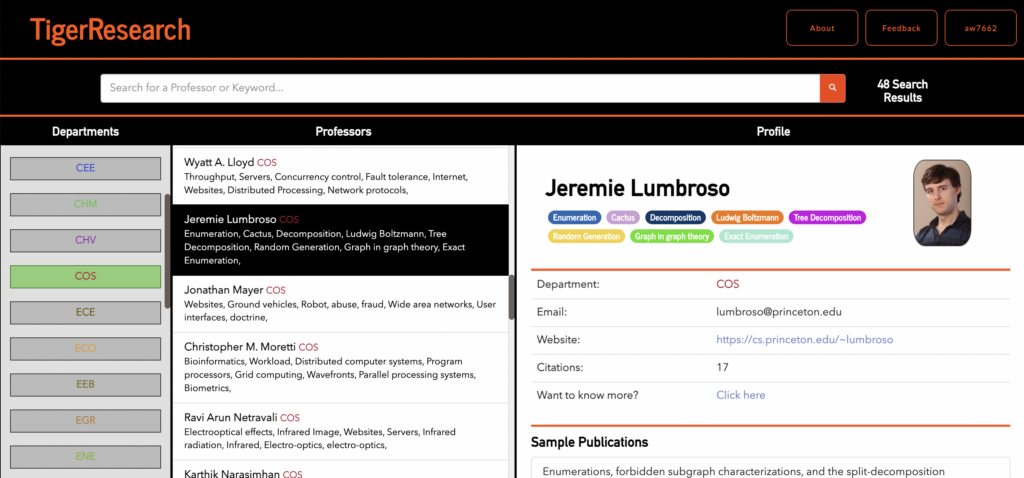Vivek Kolli ’24 is Vice Chair of the Julis-Rabinowitz Center for Public Policy and Director of Marketing and Outreach for Scholars of Finance.
A few weeks ago, I interviewed Vivek Kolli ‘24, a junior in the Operations Research and Financial Engineering (ORFE) department. Vivek is one of the three developers for TigerResearch, a comprehensive platform that allows for students to easily navigate through their database of Princeton professors and their research areas. In our interview*, we discuss his vision for the platform, the importance of entrepreneurial ideas in driving the research process, and advice for students who would like to get involved with research at Princeton.
Alexis Wu (A): How did the TigerResearch project come about? When did you work on the project, and what motivated you to do so?
Vivek Kolli (V): My freshman spring semester, I took a Freshman Seminar (FRS 157: Failure) on failure taught by Professor John Danner. One of our projects involved examining failure in our own departments, so I was thinking about the ORFE department. I reached out to several professors after finding common research interests. And while I was doing that research, it was so hard to find all the professors on a single page and search through their prior research quickly.
After taking the course, I approached [future TigerResearch co-developers] Eric Ahn ‘24 and Alex Zhang ‘24 saying, “How cool would it be if there was just one research database, where you could look up any professor, and it would tell you about their research in 30 words?” I talked to a couple seniors and juniors doing theses and junior papers, and it’s a tedious process that usually involves clicking on each faculty’s individual page and connecting with them via email. Hopefully the link to the faculty’s page worked, and hopefully the page was updated. Moreover, say as an ORFE major, if I was interested in network analysis as well as a computer science topic, I would have to click back and forth between the different departments’ websites.
I came up with the idea around March 2021, and we worked on the project all of July through August of that same year. We were able to release it just in time for my sophomore fall (September 2021).

A: Did you work with an adviser?
V: We quickly figured out we needed an adviser after the first two weeks, since executing our ideas was challenging and we lacked the resources. On the non-technical side, I reached out to Professor Danner again, who was helpful since he’s experienced in entrepreneurship and aided us in the ideation process. Eric also had a connection with Dr. Jérémie Lumbroso of the Computer Science department, who has a lab and advises similar projects. We met with him several times over the summer and he provided great direction as to how to progress with the technical aspects of the project. The website design you see right now is probably the fifth or sixth iteration after consulting and getting feedback from our professors and advisers.
A: What is some advice you have for students who are interested in getting involved with research at Princeton?
V: When you apply for a job, you have to show why you’re interested and why the company needs you. Not everyone thinks about research like this, but when students reach out to professors, they don’t demonstrate why that particular professor is the only professor that can really help you. One of the main concerns I’ve heard from professors is they don’t see why they are your best option as an adviser.
Study up on the research a professor does and the requirements they have—make sure you’ve taken the necessary and/or desired prerequisite courses. For example, Professor Olga Russakovsky, who teaches COS429: Computer Vision, wants students to take the course prior to reaching out to her about research, rather than just emailing professors whose research seems cool.
Resources can be hard to find sometimes, but there are plenty.
It’s always a good idea to try out research, even if your major doesn’t seem like something that is traditionally research-based. Give it a shot!
*Interview responses have been edited for clarity and length.
—
I’m impressed with Vivek’s initiative and vision—hearing about the process that led to the creation of TigerResearch truly demonstrates how students have the opportunity to work on research that is meaningful to both them and their campus. Through our conversation, I realized the importance of reaching out to other resources—professors, advisers, and even friends—in driving research. I encourage readers to take advantage of TigerResearch if they are interested in research at Princeton, and I wish you the best of luck in your research endeavors!
— Alexis Wu, Engineering Correspondent


